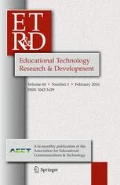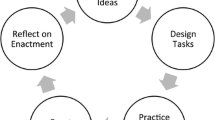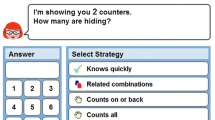Abstract
Teachers’ implementation of a problem-based learning (PBL) program was examined to determine both how they assessed student learning and their reasons for these assessment practices. Ten 6th grade science teachers used Alien Rescue, a computer-based PBL module, with their students for approximately three weeks. Interviews, observations, and teacher-developed artifacts were analyzed qualitatively. The results suggest that assessment-related issues impacted the way that teachers implemented this PBL program, with teachers using grades as extrinsic motivators, deemphasizing PBL’ usual focus on student reflection on their process and solutions, and adding assignments to the PBL program in order to provide greater structure for students’ process and help prepare them for standardized tests. Some of these adaptations conflict with practices typically advocated in the literature on PBL. The implications of these results for the design of PBL programs are discussed, with an emphasis on supporting teachers’ (a) local adaptations of PBL materials and (b) professional development through educative components embedded in PBL programs.
Similar content being viewed by others
Notes
Alien Rescue received first place in the 2001 Learning Software Design Competition, sponsored by the University of Minnesota, and an Honorable Mention for Ingenuity in the 2001 Macromedia eLearning Competition.
References
Anderman, E. M., & Johnston, J. (1998). Television news in the classroom: What are adolescents learning? Journal of Adolescent Research, 13, 73–100.
Ball, D. L., & Cohen, D. K. (1996). Reform by the book: What is – or might be – the role of curriculum materials in teacher learning and instructional reform? Educational Researcher, 25(9), 6–8.
Barab, S. A., & Luehmann, A. L. (2003). Building sustainable science curriculum: Acknowledging and accommodating local adaptation. Science Education, 87(4), 454–467.
Black, P., & Wiliam, D. (1998). Assessment and classroom learning. Assessment in Education, 5(1), 7–74.
Brown, A. L., & Campione, J. C. (1996). Psychological theory and the design of innovative learning environments: On procedures, principles, and systems. In L. Schauble & R. Glaser (Eds.), Innovations in learn: New environments for education (pp. 289–325). Mahway, NJ: Erlbaum.
Butler, R., & Nisan, M. (1986). Effects of no feedback, task-related comments, and grades on intrinsic motivation and performance. Journal of Educational Psychology, 78(3), 210–216.
Darling-Hammond, L. (1990). Achieving our goals: Superficial or structural reforms? Phi Delta Kappan, 72(4), 286–295.
Davis, E. A., & Krajcik, J. S. (2005). Designing educative curriculum materials to promote teacher learning. Educational Researcher, 34(3), 3–14.
Edwards, C. H., & Edwards, L. (1999). Let’s end the grading game. Clearing House, 72(5), 260–263.
Firestone, W. A., Mayrowetz, D., & Fairman, J. (1998). Performance-based assessment and instructional change: The effects of testing in Maine and Maryland. Educational Evaluation and Policy Analysis, 20, 95–113.
Gallagher, S. A., Stepien, W. J., & Rosenthal, H. (1992). The effects of problem-based learning on problem solving. Gifted Child Quarterly, 36(4), 195–200.
Glasgow, N. A. (1997). New curriculum for new times: A guide to student-centered, problem-based learning. Thousand Oaks, CA: Corwin.
Grolnick, W. S., & Ryan, R. M. (1987). Autonomy in children’s learning: An experimental and individual difference investigation. Journal of Personality and Social Psychology, 52(5), 890–898.
Hargreaves, A., Earl, L., & Schmidt, M. (2002). Perspectives on alternative assessment reform. American Educational Research Journal, 39(1), 69–95.
Horwitz, P., & Christie, M. A. (2000). Computer-based manipulatives for teaching science reasoning: An example. In M. J. Jacobson & R. B. Kozma (Eds.), Innovations in science and mathematics education. Mahwah, N.J.: Lawrence Erlbaum Associates.
Jones, E. A. (2002). Myths about assessing the impact of problem-based learning on students. The Journal of General Education, 51(4), 326–334.
Kain, D. L. (2003). Problem-based learning for teachers, grades K-8. Boston: Allyn and Bacon.
Kohn, A. (1994). Grading: The issue is not how but why. Educational Leadership (October), 38–41.
Kohn, A. (1999). From degrading to de-grading. High School Magazine, 6(5), 38–43.
Koschmann, T., Kelson, A. C., Feltovich, P. J., & Barrows, H. S. (1996). Computer-supported problem-based learning: A principled approach to the use of computers in collaborative learning. In T. Koschmann (Ed.), CSCL: Theory and practice of an emerging paradigm (pp. 83–124). Mahwah, NJ: Lawrence Erlbaum Associates, Inc.
Krynock, K. B., & Robb, L. (1999). Problem solved: How to coach cognition. Educational Leadership, 57(3), 29–32.
Lambros, A. (2004). Problem-based learning in middle and high school classrooms: A teacher’s guide to implementation. Thousand Oaks, CA: Corwin Press.
Lincoln, Y., & Guba, E. (1985). Naturalistic inquiry. Newbury Park, California: Sage Publications.
Linn, M., Davis, E. A., & Bell, P. (2004). Internet environments for science education. Mahwah, New Jersey: Lawrence Erlbaum Associates.
Linn, R. L. (2003). Accountability: Responsibility and reasonable expectations. Educational Researcher, 32(7), 3–13.
Liu, M., & Bera, S. (2005). An analysis of cognitive tool use patterns in a hypermedia learning environment. Educational Technology Research & Development, 53(1), 5–21.
Nespor, J. (1987). The role of beliefs in the practice of teaching. Journal of Curriculum Studies, 18, 197–206.
Norman, G. R., & Schmidt, H. G. (1992). The psychological basis of problem-based learning: A review of the evidence. Academic Medicine, 67, 557–565.
Pedersen, S. (2003). Motivational orientation in a problem-based learning environment. Journal of Interactive Learning Research, 14(1), 51–77.
Savery, J. R., & Duffy, T. M. (1995). Problem based learning: An instructional model and its constructivist framework. Educational Technology, 35(5), 31–38.
Segers, M., Dochy, F., & DeCorte, E. (1999). Assessment practices and students’ knowledge profiles in a problem-based curriculum. Learning Environments Research, 2, 191–213.
Shepard, L. A. (2000). The role of assessment in a learning culture. Educational Researcher, 29(7), 4–14.
Stiggins, R. J. (1991). Facing the challenge of a new era of educational assessment. Applied Measurement in Education, 4, 263–274.
Windschitl, M. (2002). Framing constructivism in practice as the negotiation of dilemmas: An analysis of the conceptual, pedagogical, cultural, and political challenges facing teachers. Review of Educational Research, 72(2), 131–175.
Yip, W., & Ghafarian, A. (2000). Problem-based learning assessment for information systems courses. Paper presented at the International Academy for Information Management Annual Conference, Brisbane, Australia.
Author information
Authors and Affiliations
Corresponding author
Rights and permissions
About this article
Cite this article
Pedersen, S., Arslanyilmaz, A. & Williams, D. Teachers’ assessment-related local adaptations of a problem-based learning module. Education Tech Research Dev 57, 229–249 (2009). https://doi.org/10.1007/s11423-007-9044-7
Published:
Issue Date:
DOI: https://doi.org/10.1007/s11423-007-9044-7




